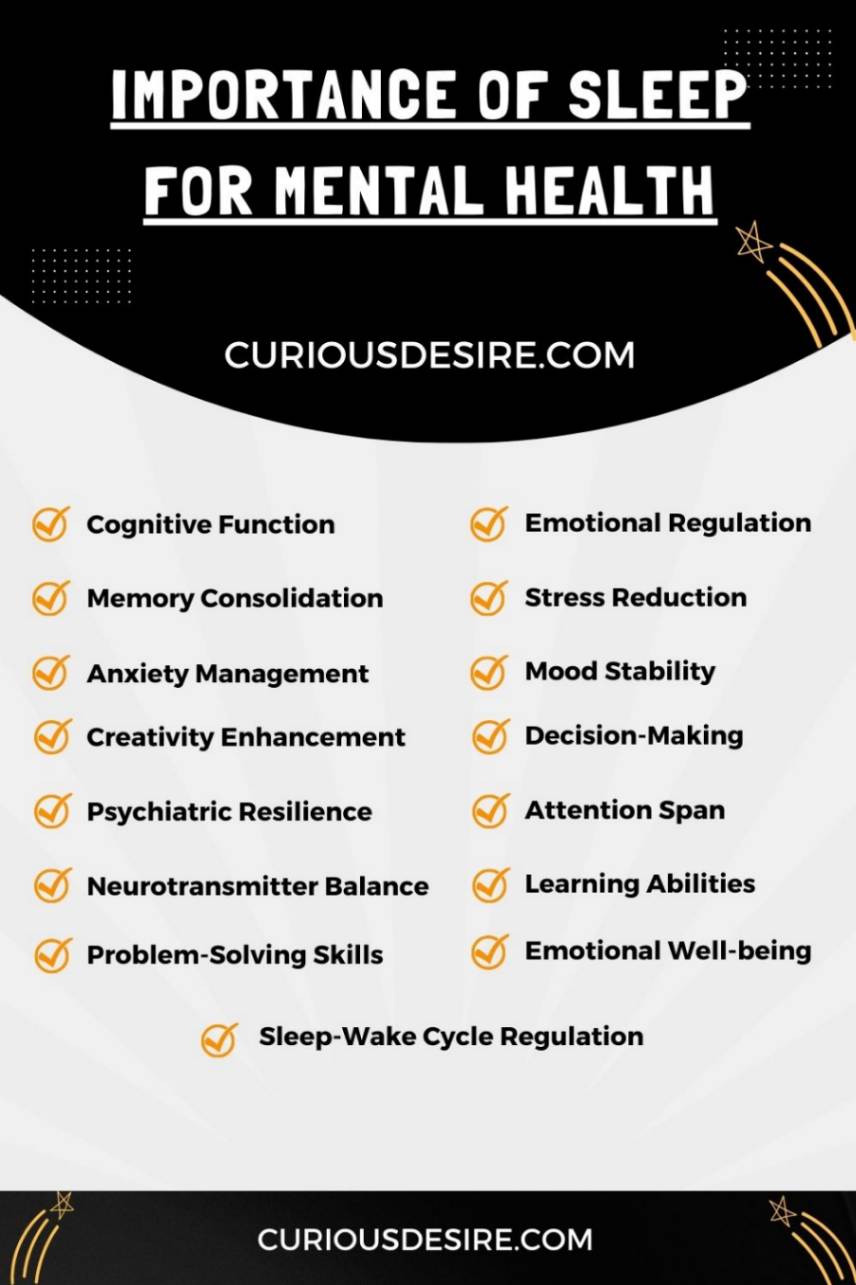Sleep is important for your mental health because it’s like a reset button for your brain. When you sleep well, your brain can rest and recharge, helping you feel better emotionally and think more clearly.
It’s during sleep that your brain organizes memories, balances hormones, and does important tasks that keep your mind in good shape.
If you don’t get enough sleep, these processes don’t work as well, and it can make you feel more stressed, and moody, and even affect your ability to focus.
In this article, we are exploring the key reasons why quality sleep matters for your mental well-being, emphasizing its role as a fundamental aspect of maintaining emotional balance and cognitive function.
Here are the 5 most common reasons why sleep is important for mental health:
- Cognitive Function
- Emotional Regulation
- Stress Reduction
- Memory Consolidation
- Mood Stability
1. Cognitive Function
Quality sleep is important for optimal cognitive function, supporting tasks like thinking, problem-solving, and information processing.
Well-rested brains recharge during sleep, enhancing our ability to approach daily challenges with mental clarity. For instance, imagine your brain as a computer.
Quality sleep recharges it, allowing efficient work, clear thinking, and effective problem-solving. Inadequate sleep is like running the computer on low battery, resulting in sluggishness, difficulty focusing, and less effective decision-making.
Conversely, insufficient sleep leads to mental fogginess, difficulty concentrating, and slower decision-making, compromising cognitive function and contributing to increased stress levels, negatively affecting overall mental well-being.
2. Emotional Regulation
Quality sleep is vital for emotional regulation, contributing to the effective handling and management of feelings. Well-rested brains process emotions smoothly, promoting better control and understanding.
Insufficient sleep disturbs this balance, making it challenging to regulate and respond to emotions.
For instance, a day after good sleep might lead to calm problem-solving during minor inconveniences, while sleep deprivation can intensify emotional responses, causing frustration.
This shift in emotional regulation demonstrates sleep’s impact on daily emotion management. Compromised regulation over time may lead to increased mood swings and heightened emotional reactivity, impacting overall mental well-being.
3. Stress Reduction
Sleep plays a pivotal role in stress reduction, acting as a natural reset button for the mind. During sleep, the body releases stress hormones, promoting relaxation and recovery.
With adequate sleep, our stress response is well-regulated, allowing us to face challenges with a clearer and more composed mindset.
Conversely, insufficient sleep disrupts this natural stress regulation, leaving us more vulnerable to heightened stress levels. Over time, chronic stress due to poor sleep can contribute to mental health issues such as anxiety and depression.
Picture a day when you’ve had a peaceful night’s sleep – you might handle stressful situations with more resilience and composure. On the contrary, a sleep-deprived day could make the same stressors feel overwhelming, leading to increased tension and emotional strain.
4. Memory Consolidation
Memory consolidation is the process where the brain organizes and strengthens new information, transferring it from short-term to long-term memory during sleep.
This vital process influences mental health, as insufficient sleep can lead to poor memory function, contributing to forgetfulness and cognitive challenges.
For example, a well-rested night before an exam enhances recall ability, while sleep deprivation can impair memory retrieval.
To improve memory consolidation and support mental well-being, prioritize consistent sleep patterns, establish a bedtime routine, and manage stress through relaxation techniques.
5. Mood Stability
Mood stability is intricately connected to sleep, influencing emotional processing and regulation. Quality sleep helps maintain a balanced mood by allowing the brain to effectively manage and respond to emotions.
Well-rested individuals typically experience more stable moods, while insufficient sleep can lead to heightened emotional reactivity, making it challenging to sustain a positive emotional state.
Over time, chronic sleep deprivation may contribute to mood disorders, including irritability, anxiety, and depression.
To promote mood stability, prioritize consistent sleep schedules, create a calming bedtime routine, and implement stress-reduction techniques, such as mindfulness or relaxation exercises.



